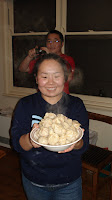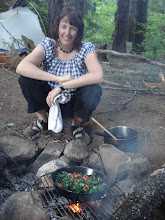 Yet another wonderful opportunity to revel in developing community around food arose yesterday. My lovely mate Benj, who is working on a doco on Mongolian hip hop, invited us to join a night of feasting at his place. He invited some of his Mongolian friends, who invited their friends, plus his other mates who've spent time there and/or worked on the film with him – and us, the ring-ins because of our shared passion for food and community. :-) It was quite an interesting social experiment, really – put a bunch of strangers in a room together with food, get one group to teach the other how to make something from their culture, and add vodka. Trust me, it was a raving success!
Yet another wonderful opportunity to revel in developing community around food arose yesterday. My lovely mate Benj, who is working on a doco on Mongolian hip hop, invited us to join a night of feasting at his place. He invited some of his Mongolian friends, who invited their friends, plus his other mates who've spent time there and/or worked on the film with him – and us, the ring-ins because of our shared passion for food and community. :-) It was quite an interesting social experiment, really – put a bunch of strangers in a room together with food, get one group to teach the other how to make something from their culture, and add vodka. Trust me, it was a raving success!The evening began with some of the predictable stilted moments as we all sought to find common ground. Mostly, the Aussies were busy asking the Mongolians questions about the current political situation as they've just had a change of government (and I won't tell you who asked 'does China appoint your leader?' - duffer), as well as learning more about what brought them to Melbourne (all are students, and all intend to return to Mongolia when they finish). I realised how little I really know about their country, including how much closer the Mongolian language seems to be to Russian than it is to Chinese. Most had brought a plate to share, so after recovering from an earlier outing to yum cha with Billy, we tucked in to a variety of pickled salads, a beef noodle dish, kim chee and khuushuur (deep fried large beef dumplings). And of
 course, that gave us plenty more to discuss.
course, that gave us plenty more to discuss.One interesting observation by Zula, who is studying finance at Melbourne Uni, was that the beef tastes quite different here in Australia. Upon further reflection, we agreed that it might be due to the large scale farming methods used here and the relatively unvaried diet of the animals, as opposed to the free ranging of herds in Mongolia and the diversity of grasses in their diet. Zula reckons the beef in Mongolia is gamier and, essentially, tastier. I know it made me want to taste some!
Most of us were drinking vodka, though a number of people did enjoy Stuart's homebrew and I noted that a couple of the Australians who had lived in Mongolia stuck to wine. I should really have taken better note of that, as I suspect they had learned a lesson up there. What I understand today is that our drinking habits, usually restricted to wine and beer, are totally unsuitable when drinking vodka. One should really sip small glasses of the stuff if you're going to have it at all, but I know I for one was impressed at how smooth it was (especially the delightful Mongolian Chinggis) and drank it rather like I do water. Ahem.

After a couple of drinks and a bit to eat, it was time to make the buuz, which are steamed dumplings. We made three fillings: beef with red onion & garlic, lamb with red onion, garlic & coriander, and another lamb with the same fillings, but with kim chee added as well. To salt the mince, Zula dissolved salt in hot water and we mixed that through, which also made the mixture more moist. At one stage, we forgot which bowl had the beef and which the lamb, and I think because it was quite cold from the fridge, it was difficult to smell the difference. I suddenly remembered that a cook should taste everything as you go along, even crazy raw stuff (thanks to Masterchef!), and that actually there is nothing crazy about raw beef anyway (and so presumably lamb, too?), so tasted for the difference. I love those visceral moments when you feel like you're inhabiting your 'real cook' disposition.

The dough for the wrappers was equally straightforward, made simply of flour and water. It was then rolled into long cylinders, chopped into smallish pieces, slightly flattened and tossed into a bowl with more flour to dust it well. Next each piece is rolled quickly from the edges to make a circle, leaving the centre slightly thicker than the edges. A scoop of filling, and then to quickly fold each dumpling closed in a pretty (sometimes) little flower-like shape. Some were folded more like gyoza, which was meant to identify them as the ones with kim chee, until people got confused and just rolled them however they wanted. Fortunately, I don't think any kids ended up with a kim chee buuz! The girls told me that one's grandmother would usually teach you to make buuz, and the shape would be according to her habit, so would vary from family to family. This is exactly what Masa taught me years ago about Japanese dumplings, and what I lear
 ned in Vietnam about spring rolls. Standing there in the warmth of Benj's kitchen, chatting, cooking, learning and tasting, really epitomised what I love about food – it's such a conduit for engaging with people and their histories, and even in an unfamiliar place, it's ultimately such a homely experience.
ned in Vietnam about spring rolls. Standing there in the warmth of Benj's kitchen, chatting, cooking, learning and tasting, really epitomised what I love about food – it's such a conduit for engaging with people and their histories, and even in an unfamiliar place, it's ultimately such a homely experience.Once the buuz were made, they were steamed for about 15 minutes and then served. They
 were all very delicious, and I discovered the pleasure of adding a little pinch of kim chee or pickled cabbage and carrot to each bite rather than dipping them in a sauce. We made dozens of them, but they still disappeared very quickly.
were all very delicious, and I discovered the pleasure of adding a little pinch of kim chee or pickled cabbage and carrot to each bite rather than dipping them in a sauce. We made dozens of them, but they still disappeared very quickly.After the buuz, the Mongolians sang some traditional songs, with a haunting sound reminiscent of throat singing, though it wasn't actually. In response, the Aussies sang Waltzing Matilda and Botany Bay, though our mastery of the lyrics was somewhat wanting. Throughout the feasting and cooking, our three children and the three Mongolian children present ran madly around the house, stopping to grab a fistful of lollies each time they passed through the lounge room. And perhaps inspired by Benj's filmmaking talents, they spent quite awhile 'making a film', but needed a camera with night vision, so moved on to finding ghosts.
I've often compared food with music in terms of its cultural significance, issues of authenticity, and capacity to bring people together. Last night was a brilliant example of exactly that, just as the weekends we spend with Benj and the Binks in Violet Town harvesting olives are particularly joyful as they're centred around food and music. I'm sure I'm not the only one who had a really lovely time, learned a great deal, made new friends and tasted new horizons last night.

